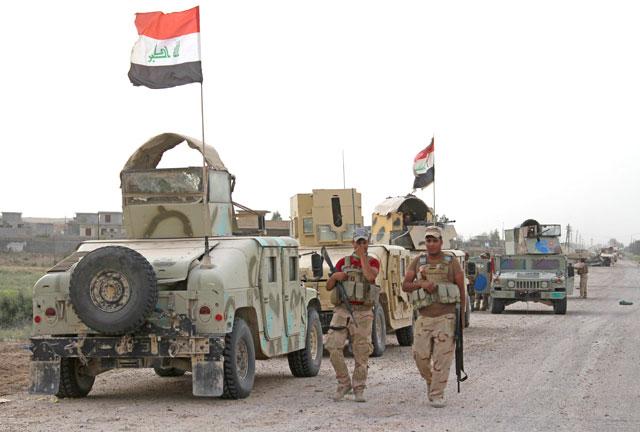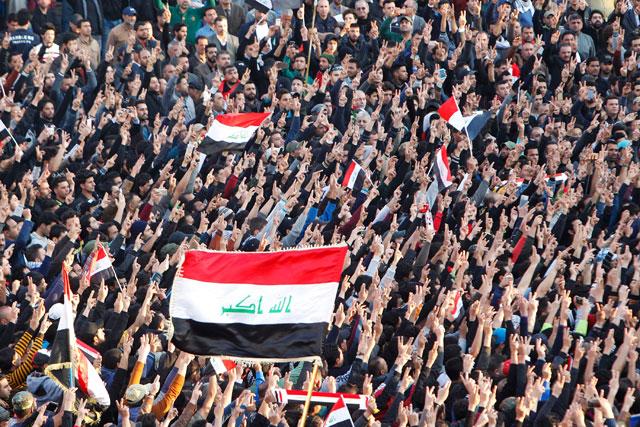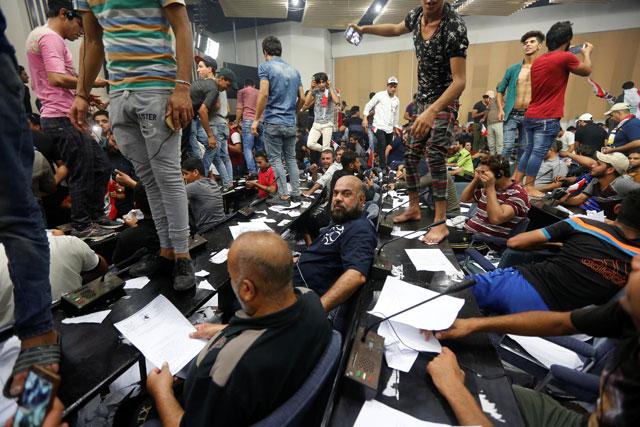You are here
UN envoy warns that Iraq’s political crisis helps extremists
By AP - May 07,2016 - Last updated at May 07,2016

Fighters from the Iraqi pro-government forces take part in a military operation against the Daesh terror group near Amriyat Al Fallujah, west of the capital Baghdad in Anbar province, on Thursday (AFP photo)
UNITED NATIONS — The top UN envoy in Iraq strongly urged the country's political leaders and civil society on Friday to work together to resolve the current political deadlock, warning that the ongoing crisis and chaos are only serving the interests of Daesh extremists.
Despite notable progress on the ground against the Daesh terror group, Jan Kubis told the UN Security Council that "it remains a formidable and determined enemy that constantly adjusts its tactics and attack patterns”. He pointed to the discovery of more than 50 mass graves in territory retaken from Daesh, including three found on April 19 in the soccer grounds area of Ramadi, and reports that the extremist group is using chemical weapons.
Kubis said enemies of Iraq — first and foremost Daesh extremists — "stand to benefit from political instability and lack of reforms”.
He said a profound political crisis engulfing Baghdad and the country has paralysed the work of the government and parliament "and added a new layer of complications to the already complex set of military, security, humanitarian, economic and human rights challenges the country is facing”.
Supporters of Shiite cleric Muqtada Al Sadr have been holding demonstrations and sit-ins for months to demand an overhaul of the political system put in place by the US following the overthrow of Saddam Hussein in 2003. On Saturday, hundreds of his supporters stormed the heavily fortified Green Zone in the Iraqi capital, Baghdad, and broke into the parliament building.
Kubis said a majority of Iraqi political blocs have rejected replacing the Cabinet created on the basis of party affiliation or ethnic or sectarian with a Cabinet of technocrats sought by Sadr and protesters who argue this is the only way "to enact genuine reforms, get rid of a powerful patronage system and achieve success in fighting corruption”.
The political blocs view Sadr's actions as an attempt to take power and de-legitimise the government and parliament, he said.
"The stability, security and unity of Iraq hinge on an effective and inclusive political system, and equality in decision-making at the federal and local levels, tangible solutions to prevent political and sectarian exclusion," Kubis said.
He urged the government, constitutional and political leaders and civil society to hold talks that not only resolve the political impasse but give hope to Iraqis for a better future and unite efforts behind the “critical effort” of fighting Daesh extremists.
But Kubis also reiterated Secretary General Ban Ki-moon’s warning that Daesh cannot be defeated by military means alone and that efforts to retake Daesh-controlled territory will not be sustained without addressing the root causes of violent extremism and supporting people who have been displaced.
Iraq’s UN Ambassador Mohamed Alhakim said the country’s leaders and elected political blocs are working to implement the prime minister’s reform program but focused his speech to the council on the fight against Daesh.
“The year 2016 is a crucial year for Iraq, it is crucial for combatting terrorism and recovering all the territory taken over by the [Daesh] terrorist gangs,” he said.
Alhakim urged the US-led international coalition to build on military victories and the weakening of Daesh to liberate Mosul, the country’s second-largest city. He also urged the Security Council to set up an “international legal mechanism to pursue and bring to justice the criminals of [Daesh].”
Kubis called the humanitarian crisis in Iraq “one of the world’s worst,” saying nearly a third of the population — over 10 million people — need humanitarian assistance.
In a worst case scenario, he said, more than two million additional people may be newly displaced by the end of the year.
Kubis urged donors to contribute to the $861 million UN appeal to help seven million Iraqis, saying only a quarter of the amount has been secured so far.
Related Articles
BAGHDAD — Thousands of Iraqis, mostly supporters of prominent cleric Moqtada Sadr, gathered in Baghdad Tuesday to pay their respects to seve
BAGHDAD, Iraq — Iraqi cleric Moqtada Sadr called for an "inclusive" government to be formed quickly, as he sounded out the heads of key parl
BAGHDAD — Iraqi anti-government protesters tore down walls and poured into the capital's heavily-fortified Green Zone on Saturday, where the


















